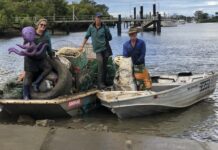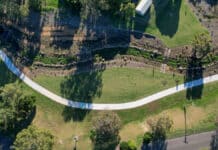
Source: Department of Agriculture and Fisheries
A Bundaberg man has been fined $20,000 plus costs after being found guilty in the Bundaberg Magistrates Court of deliberately damaging marine plants in the Burnett River.
Minister for Agricultural Industry Development and Fisheries Mark Furner said the prosecution followed complaints from locals and long-term surveillance by the Queensland Boating and Fisheries Patrol of the site where the damage occurred.
“In 2018 the man was wading out into the river in front of his home and pushing or pulling marine plants into the tidal current so they would float away,” Mr Furner said.
“In the previous year, he also piled plants up and burnt them or sprayed them with herbicide.
“We seized a lot of evidence from his house including herbicide and pressure sprayers.
“This fine of $20,000 sends a strong message that the wilful damage of marine plants will not be tolerated. You will be found out and you will go to court.”
Mr Furner said marine plants are protected whether they grow on privately or publicly owned land.
They are a fundamental part of fish habitat and a vital natural resource that help sustain fish for the future for commercial, traditional and recreational fishing.
“We want to leave a legacy of a sustainable fishery for our children and grandchildren,” he said.
“That is why laws protecting marine plants are so important.”
Marine plants include mangroves, seagrass, salt couch grass, succulent plants, samphire plants, saltmarsh plants, grass-sedge wetland plants (grasses, rushes and sedges), melaleuca (paper barks) and casuarina (coastal she-oaks) and algae.
Prohibited impacts: pruning or trimming mangroves on any land; reclaiming or filling tidal land; dumping rubbish on tidal land; mowing or burning marine plants; collecting mangrove timber or seagrass either dead or alive; modifying fish habitats and dredging tidal lands.
For more information, visit this website.








Unsure of this offence although the picture shows standing dead wood that would surely be a prime target to ease the flow of water during a flood event. Cleaning the dead wood from the river channels banks I think would be a positive step in helping overcome minor flooding in some instances.
Comments are closed.